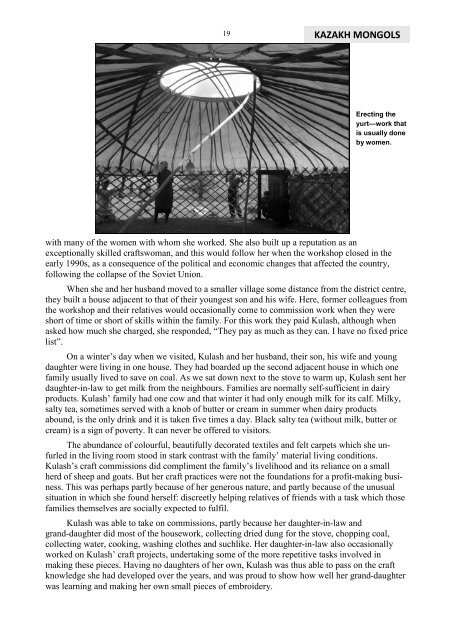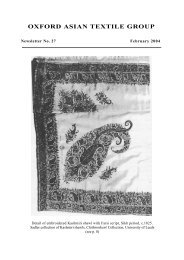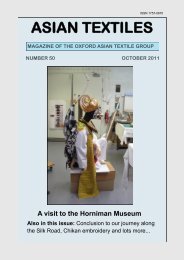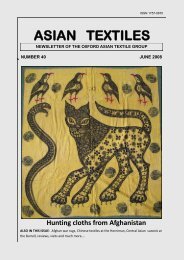ASIAN TEXTILES - OATG. Oxford Asian Textile Group
ASIAN TEXTILES - OATG. Oxford Asian Textile Group
ASIAN TEXTILES - OATG. Oxford Asian Textile Group
You also want an ePaper? Increase the reach of your titles
YUMPU automatically turns print PDFs into web optimized ePapers that Google loves.
19 KAZAKH MONGOLSErecting theyurt—work thatis usually doneby women.with many of the women with whom she worked. She also built up a reputation as anexceptionally skilled craftswoman, and this would follow her when the workshop closed in theearly 1990s, as a consequence of the political and economic changes that affected the country,following the collapse of the Soviet Union.When she and her husband moved to a smaller village some distance from the district centre,they built a house adjacent to that of their youngest son and his wife. Here, former colleagues fromthe workshop and their relatives would occasionally come to commission work when they wereshort of time or short of skills within the family. For this work they paid Kulash, although whenasked how much she charged, she responded, “They pay as much as they can. I have no fixed pricelist”.On a winter’s day when we visited, Kulash and her husband, their son, his wife and youngdaughter were living in one house. They had boarded up the second adjacent house in which onefamily usually lived to save on coal. As we sat down next to the stove to warm up, Kulash sent herdaughter-in-law to get milk from the neighbours. Families are normally self-sufficient in dairyproducts. Kulash’ family had one cow and that winter it had only enough milk for its calf. Milky,salty tea, sometimes served with a knob of butter or cream in summer when dairy productsabound, is the only drink and it is taken five times a day. Black salty tea (without milk, butter orcream) is a sign of poverty. It can never be offered to visitors.The abundance of colourful, beautifully decorated textiles and felt carpets which she unfurledin the living room stood in stark contrast with the family’ material living conditions.Kulash’s craft commissions did compliment the family’s livelihood and its reliance on a smallherd of sheep and goats. But her craft practices were not the foundations for a profit-making business.This was perhaps partly because of her generous nature, and partly because of the unusualsituation in which she found herself: discreetly helping relatives of friends with a task which thosefamilies themselves are socially expected to fulfil.Kulash was able to take on commissions, partly because her daughter-in-law andgrand-daughter did most of the housework, collecting dried dung for the stove, chopping coal,collecting water, cooking, washing clothes and suchlike. Her daughter-in-law also occasionallyworked on Kulash’ craft projects, undertaking some of the more repetitive tasks involved inmaking these pieces. Having no daughters of her own, Kulash was thus able to pass on the craftknowledge she had developed over the years, and was proud to show how well her grand-daughterwas learning and making her own small pieces of embroidery.
















